The question can arise in your mind when you’re towing a trailer.
Whether using your trailer hitch for towing or just as a storage rack, it’s important to have a lock to keep your belongings safe.
Keep reading the article to know if there is a lock for a trailer. You’re sure to discover one that fits your needs!
Is there a lock for the trailer hitch?
Yes, there are locks available for trailer hitches.
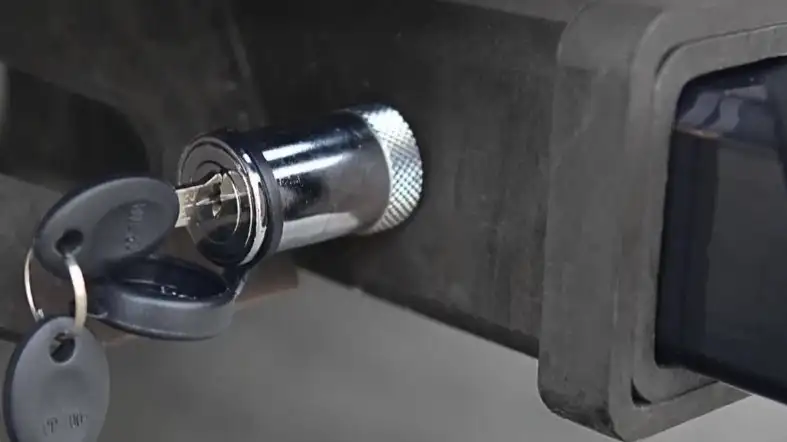
Many different locks are available on the market, so choosing one that will work well for your particular hitch is essential.
This is necessary to consider if you are using your hitch for towing or as a storage rack.
Here some sizes of locks are given for the various classes of trailers.
| Trailer | Locks Size |
|---|---|
| Class I or Class II | 1/2-inch |
| Class II or Class IV | 5/8-inch |
Should I lock my trailer hitch?
You should lock your trailer hitch if you use it for towing or as a storage rack.
There are many different ways to lock a trailer hitch,
Trailer hitches are a great way to tow a trailer or other large items, but it’s important to ensure they are correctly secured.
A trailer hitch lock may provide you with a sense of comfort, knowing your valuables are safe and secure.
Many types of locks are available, so choose one that will work well for your particular hitch.
How Do You Pick The Best Trailer Hitch Lock?
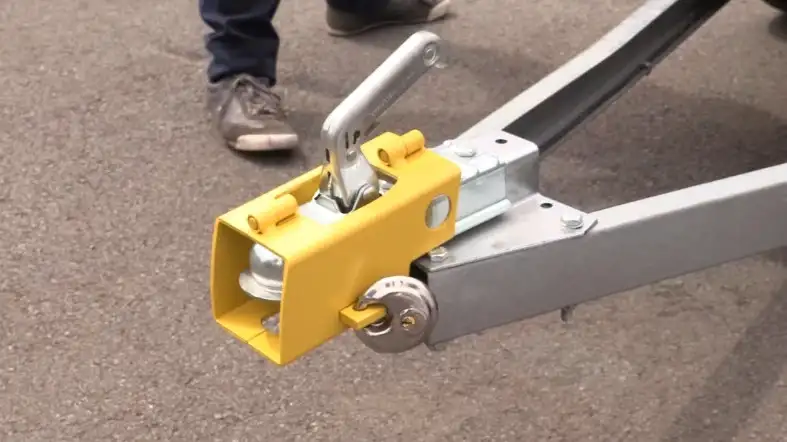
There are a few considerations to address while selecting a trailer hitch lock.
With these things in mind, you’ll be able to find the perfect lock for your trailer hitch.
So get out there and start shopping!
Usage
First, consider what you’ll be using the hitch for.
A primary lock may suffice if you’re using it for occasional towing.
However, if you’re using the hitch for storage or racks, you’ll want something more sturdy and secure.
Size
The size of the lock is essential.
Make sure to choose a size that will fit your particular hitch.
You want a lock that’s just the right size and one that’s just enough—both can be effective.
Trailer Class
Trailer hitches are classified into three types: Trailer hitches are classified as Class I, II, or III.
Each one is designed for different weights and sizes of trailers.
Make sure you know the weight and size of your trailer before choosing a hitch.
Class I
This is the lightest-duty hitch and is designed for trailers weighing up to 2,000 pounds.
Class I hitches typically have a 1-1/4 inch receiver opening.
Class II
This hitch is for mid-sized trailers, usually weighing between 2,000 and 3,500 pounds.
Class II hitches have a 1-1/4 or 2-inch receiver opening.
Class III
This is the heaviest-duty hitch and can tow trailers up to 8,000 pounds.
Class III hitches have a 2-inch receiver opening.
Types
You can find the perfect lock for your needs with a bit of research.
Many types of locks are available on the market, so choosing one that will work well for your particular hitch is important.
Make sure to read reviews before purchasing a lock, and always test it out before using it to make sure it’s secure.
Keyed lock
A keyed lock is the most common type of trailer hitch.
It uses a key to secure the locking mechanism.
Combination locks
Combination locks use a combination of numbers to unlock the mechanism.
Some locks use a fingerprint scanner to open, which can be handy if you lose your keys.
Whichever type of lock you choose, make sure that it is sturdy and weather-resistant so that it can stand up to the elements.
Materials
Look for a hitch lock that’s made from sturdy materials.
You want a lock that won’t rust or corrode over time. Heavy-duty steel is always a good choice.
Design
You want a lock that’s easy to use and that will work with your hitch.
The design of the lock is also essential.
Make sure it’s easy to use and will fit your particular hitch.
Budget
Considering the price is also important.
There are many different locks available at a variety of price points. Choose one that fits your budget and needs.
Are There Any Installation Tips For Trailer Hitch Locks?
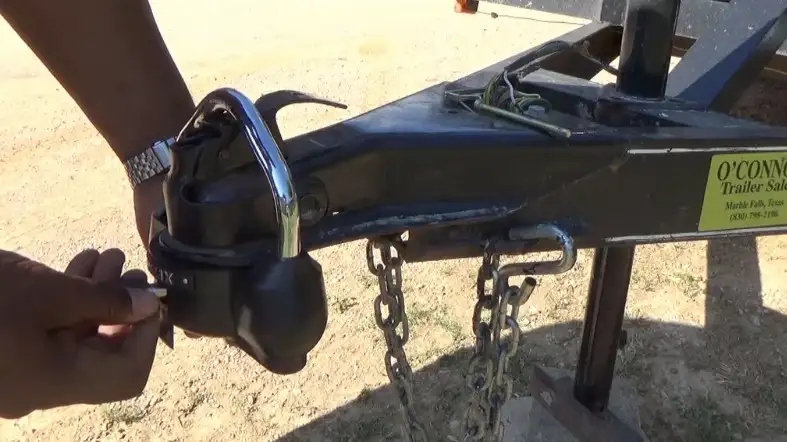
Follow the directions that came with your trailer hitch lock.
This will ensure that it is installed correctly and will help to prevent any problems with the lock in the future.
Some general tips for installing a trailer hitch lock include:
- Read all of the instructions that come with the lock before beginning installation. This will help you to understand the process and avoid any mistakes.
- Install the lock on the hitch while it is not attached to a vehicle. This will make reaching all of the necessary parts of the hitch easier.
- Make sure that the area around the hitch is clean before beginning installation. This will help remove dirt and debris from getting caught in the lock’s mechanism.
- Follow the specific instructions for your particular lock. This will ensure that it is installed correctly and will work properly.
What Are The Benefits Of Using A Lock For Your Trailer Hitch?
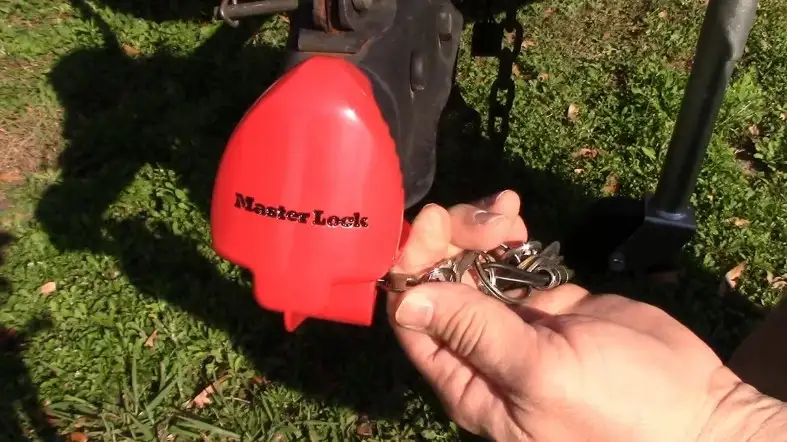
If you are using your trailer hitch for towing or storage rack, there are many benefits to using a lock.
Locks help to prevent theft and provide peace of mind knowing that your belongings are secure.
Some of the benefits of using a lock for your trailer hitch included:
Prevention of theft
It protects thieves who want to detach the trailer from your car and make away with it.
A lock makes it more difficult for them to do so, thus acting as a prevention method.
Peace of mind
A trailer hitch lock can give you peace of mind when towing your trailer or using it as a storage rack.
Knowing that your belongings are secure can provide mental peace when you are away from home.
It ensures that your trailer remains where you left it.
Security
Your possessions are given an additional layer of security by locks.
You can be confident that your trailer will be secure since trailer hitch locks are made to be incredibly hard to break.
Easy to use
A trailer hitch lock is easy to use. Insert the lock into the receiver and secure it with the provided key.
This will ensure that your trailer remains securely attached to your vehicle.
Discreet appearance
Hitch Locks are a wonderful alternative if you’re seeking a trailer hitch lock that is not readily apparent.
Potential thieves will be unable to quickly see this lock because it is concealed beneath the license plate.
Low cost.
Locks are available in various styles and price points, so you can find one that fits your budget.
How To Use A Trailer Hitch Lock Properly?
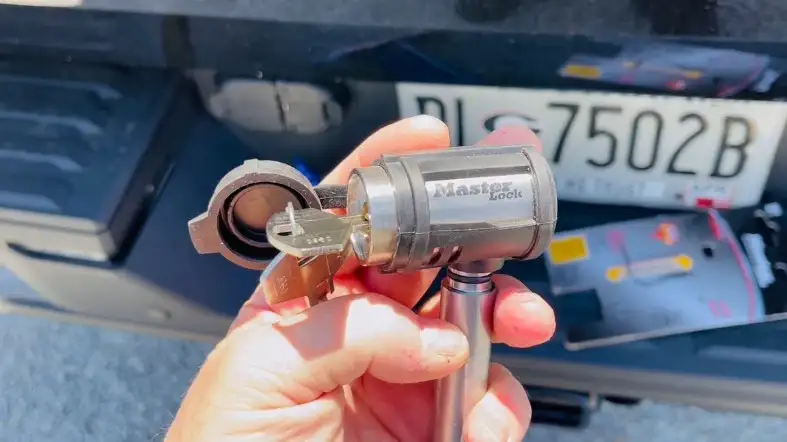
If you are using your trailer hitch to tow a trailer or store items on it, you will want to consider getting a lock.
Many types of locks are available, so choosing one that will work well for your particular hitch is essential.
Here are some tips for using a trailer hitch lock properly:
- Choose a lock specifically designed for use with a trailer hitch. This will ensure that the lock fits properly and works correctly.
- Make sure the lock is secured in a place that is difficult to reach. This will make it more difficult for thieves to tamper with it.
- Be sure to have the key to the lock readily available. This will make it easier to unlock the hitch when you need to use it.
- Test the lock regularly to ensure that it is working correctly. This will help you avoid any problems when you need to use it.
- Make sure to adhere to the lock’s use and maintenance guidelines provided by the manufacturer.
- If you are not using the trailer hitch, remove the lock and store it in a safe place. This will help to prevent theft or damage.
Following these instructions may ensure that your trailer hitch lock will function correctly and protect your trailer or stored valuables.
How To Keep Your Trailer Hitch Lock Secure?
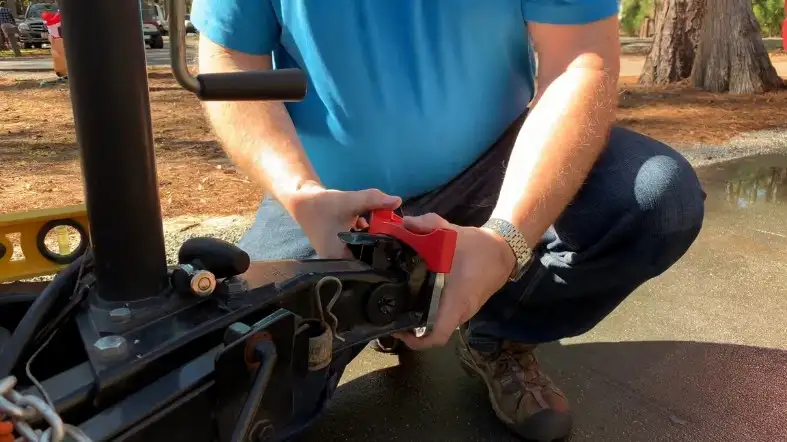
Trailer hitch locks are an important way to keep your trailer secure.
Many different locks are available on the market, so choosing one that will work well for your particular hitch is important.
Here are a few suggestions to keep your trailer hitch lock secure:
Use a high-quality lock
Cheap locks are more likely to be broken or picked.
Use a heavy-duty chain or cable. This will make it more difficult for thieves to cut through.
Make sure the lock is installed correctly
Proper installation is key to the hitch lock’s security.
Ensure the lock is positioned correctly and tightened so it cannot be easily removed. This will make it more difficult for someone to remove the lock.
Choose a high-quality lock.
There are many different hitch locks available on the market, so choosing one made from high-quality materials is crucial.
A durable, well-made lock will be more complex for thieves to break or remove.
Test the lock before using it.
Before using your hitch lock, it is a good idea to examine it to ensure it is working properly.
This will help you determine how secure it will be in practice.
Try to remove the lock yourself to see how difficult it is to do.
Store the key to the lock in a safe place.
Keep the key somewhere safe, so you don’t lose it.
You can keep it on your keychain or in a drawer near the hitch.
This will prevent someone from finding and using the key to unlock the hitch.
Make sure the lock is of good quality.
Cheap locks are easy to break.
So bring a good one with you to keep your trailer hitch locked and safe.
Following these tips will help to keep your trailer hitch lock secure.
FAQ about trailer hitch locks
Are There Any Risks Associated With Locking My Trailer Hitch?
While there are no guarantees in life, locking your trailer hitch is likely to deter would-be thieves and give you some peace of mind.
That said, choosing a high-quality lock is crucial to withstand tampering attempts.
Also, be sure to read the instructions carefully so that you can adequately secure the lock.
Doing so will help to ensure that your hitch remains safe and secure.
How Often Should I Check My Trailer Hitch Lock?
You should check your trailer hitch lock every time you use it.
If you notice any damage or wear, you should replace the lock.
This will ensure that your trailer remains securely attached to your vehicle.
How Do I Know If My Trailer Hitch Lock Is Working Properly?
There are a few ways to test whether or not your trailer hitch lock is working properly.
One way is to attempt to remove the locking pin with the key.
The lock will likely work properly if the pin does not come out.
Another way to test the lock is to try to move the trailer hitch while the lock is engaged.
If the hitch does not move, the lock will likely work properly.
How Can I Troubleshoot Problems With My Trailer Hitch Lock?
First, ensure the lock is correctly positioned on the hitch receiver.
If the problem persists, check if the locking mechanism is damaged or obstructed.
If necessary, consult a professional for further assistance.
The Final Thoughts
So, the answer to this question you are looking for a trailer hitch lock is provided above.
While some are more expensive than others, they all have the same function—keeping your trailer safe.
When choosing a lock, be sure to pick one made from high-quality materials that will fit your particular hitch.
With a little research, you can find the perfect lock to keep your trailer safe and sound.
